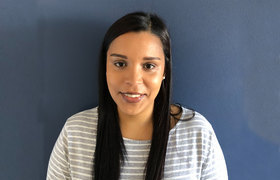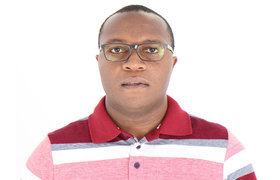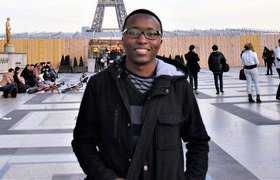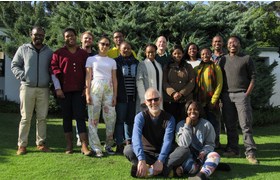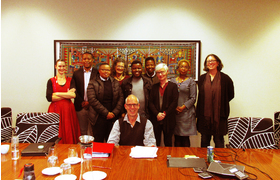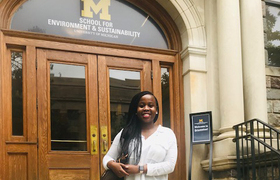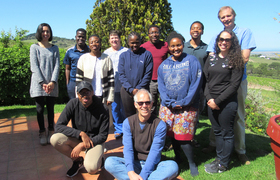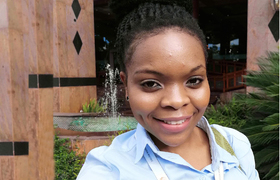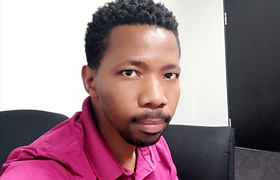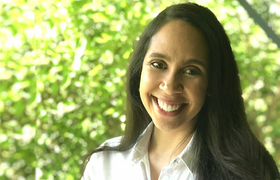Muzi Sikhonde: New nGAP member
22 October 2019 | Story Muzi Sikhonde. Photo Provided. Read time 3 min.
I have just joined the Numeracy Centre in the Centre for Higher Education and Development (CHED). Since developing my interest in maths at university, I have become more and more interested in how students learn and develop statistical skills. In my work in the Numeracy Centre I hope to be able to use the experiences that I have had in assisting UCT’s students to become comfortable with numbers and to get excited about the mysteries that they conceal and can unlock.
I was born in Benoni, east of Johannesburg. I spent half the time of my childhood in Johannesburg and the other in uMlazi near Durban, KwaZulu Natal. I finished high school at Velabahleke Secondary School in uMlazi township. Growing up, my family consisted of both my parents, my older sister and younger brother.
During the 90s my family moved around a lot because of the political turmoil in the country, therefore I did my primary schooling in many different schools, hence rapid adaptation was key to my school progress. As a young pupil I showed great aptitude for language and the sciences, especially mathematics and physics. Even when my home life may not have been great, I found order and solace in the art of mathematics like many before me who were fascinated by this wonderful subject.
Mathematics as the art of logical and deductive reasoning helped me to be able to rationalise most of the challenges I came across. My source of inspiration was reading books on the history of mathematics, especially about the Pythagoreans and their belief in numbers. My parents believed in my talent and encouraged my interest.
I began my tertiary education at UCT, majoring in electrical engineering (2001–2004). My choice of UCT was influenced by peer pressure, since most students who were top of the class the previous year all came to UCT. A poor choice of a career path and overall misunderstanding of university life and culture led me to switch to the University of the Western Cape (UWC) where I studied mathematics and statistics.
I graduated from UWC in March of 2008 and returned to UCT to join the National Astrophysics and Space Science program (NASSP) for a postgraduate honours degree. I graduated with honours in astrophysics and space science in 2009.
I completed my master’s degree in extragalactic astronomy and theoretical cosmology in 2012. My dissertation was based on testing Chameleon photon oscillation using pulsars. The Chameleon is a hypothetical scalar fundamental particle with a variable mass that depends on its environment. These particles are said to oscillate (or change) into photons (particles of light) and vice versa as they travel through a magnetic field.
Pulsars are highly spinning neutron stars that produce strong magnetic fields in the universe. The light emitted by these stars can oscillate into Chameleons, thereby reducing or enhancing the amount of light we observe with our radio telescopes. My master’s degree studies were supported by the Square Kilometer Array (SKA) bursary scheme I obtained after completing the honours program.
In September 2012 I enrolled for a PhD in the mathematics department at UCT. I am currently completing my thesis, which is titled: “The Shear-free Perfect Fluid Theorem in General Relativity”.
I am honoured to join Phase 5 of the nGAP group. I hope all the skills I have learned throughout the years of my research will be beneficial to this journey of becoming an academic and will contribute to society as a whole.
 This work is licensed under a Creative Commons Attribution-NoDerivatives 4.0 International License.
This work is licensed under a Creative Commons Attribution-NoDerivatives 4.0 International License.
Please view the republishing articles page for more information.
New Generation of Academics Programme (nGAP)
UCT has responded energetically to the New Generation of Academics Programme (nGAP), an opportunity provided by the Department of Higher Education (DHET) to build a new generation of black South African academics. The DHET’s 2015 vision document, “Staffing South Africa’s Universities Framework: A comprehensive, transformative approach to developing future generations of academics and building staff capacity”, proposes a suite of initiatives to address the challenge, with nGAP being the major instrument to increase the numbers of black South African academics.
The programme “involves the recruitment of highly capable scholars as new academics, against carefully designed and balanced equity considerations and in light of the disciplinary areas of greatest need”. The nGAP scholars are appointed into permanent positions where from the outset their conditions are customised to ensure their successful induction into the ranks of established academics.
The DHET provides funding over a six-year period to support the appointment of an nGAP lecturer, and their time is protected to provide the best possible opportunity for the completion of a doctorate degree in the shortest possible time. Once the degree is completed, the nGAP lecturer’s teaching commitments are steadily increased until they shoulder a full teaching load.
Since the first advertisement for nGAP posts in 2015, UCT has been awarded 17 nGAP positions: 5 (Phase 1), 4 (Phase 2), 3 (Phase 3) and 5 (Phase 4). These are distributed across all faculties.
UCT’s nGAP scholars operate as a single cohort, managed and coordinated by Dr Robert Morrell. Lecturers meet for quarterly meetings, writing retreats and various capacity-building activities all designed to support the completion of postgraduate qualifications (particularly doctorates) and to develop records of achievement that will testify to their emergence as self-standing, excellent academics. Each lecturer is mentored by a senior scholar, who provides support and guidance on the challenges that routinely face academics.
The nGAP manager sets great store in building the cohesion of the cohort and encouraging the establishment of new UCT networks while producing a collaborative, mutually supportive and embracing work culture.
According to Dr Morrell, “This group of academics will lead UCT in 15 to 20 years’ time ... Their vision of excellence, of being African and South African, of serving a wider community and producing knowledge for the planet, the continent and the country, will power UCT in years to come.”
Newsletters
In the news
